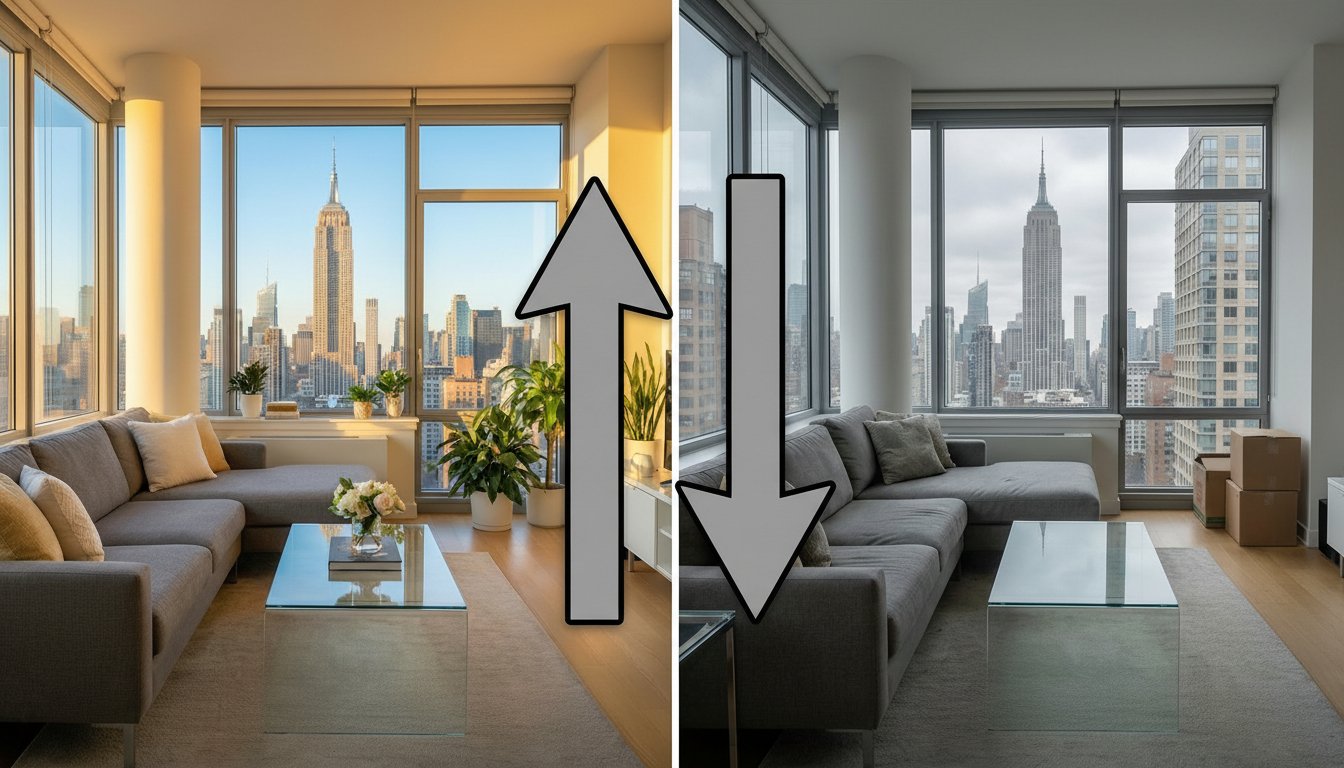Navigating Condos Vs. Co-Ops In NYC: A Smart Buyer's Guide
When shopping for a home in NYC, you'll be faced with a critical choice: should you buy a condo or a co-op? If you're a first-time buyer or you're new to the NYC market, the decision may feel overwhelming, as they both have their pros and cons.
So, what is the difference between a co-op and a condo in NYC? Which grows your wealth and which quietly drains it? In this guide, you'll discover which option fuels smarter long-term investment, backed by real NYC price, tax, and appreciation data.
You'll learn how each choice shapes your daily freedom, from renovation rules to amenity perks. You'll also get answers to some of the most frequently asked questions from around the web with insider nuances you won't find in a Reddit thread.
This coop vs condo in NYC face-off might save you six figures. Skip it and you risk trapping your cash in a slow-moving asset.
What Is the Difference Between a Condo and a Co-Op?
In NYC, the main difference between a co-op and a condo is how you own the property. Condo buyers own their individual unit and a share of the building’s common areas. Co-op buyers own shares in a corporation that owns the building and get a lease to live in a specific unit.
The sales price tends to be higher with a condo vs co-op in NYC. Although co-ops also feature more restrictions and hidden costs that can quickly add up in the long run.
Picture a LEGO road that forks. In the left lane is a pre-war co-op building. In the right lane, a shiny, glass brick condo. Two buyers roll forward.
In the co-op lane, they slam into three roadblocks: Board package, liquidity test, and interview.
In the condo lane, they glide past one modest cone: The right of first refusal.
Yes, the condo costs 15% more upfront, but it races to the finish while the co-op buyer burns weeks and dollars at every checkpoint.
Beyond the ownership structure, there are several major differences between a condo and a coop in NYC when it comes to the finances, approval process, and the lifestyle they offer. Here is a side-by-side comparison of all the important considerations you should make.

Condos vs Co-Ops: The Money and Financial
Sales Price
As of the second quarter of 2025, the median price of Manhattan condos for sale was around $1.67 million. In comparison, the median price of a co-op for sale in Manhattan was around $850,000. So the median price of a condo vs co-op in NYC was nearly 50% higher.
On a per-square-foot basis, Manhattan condos averaged about $2,045 in Q2 2025, versus roughly $1,992 for co-ops.
What about the monthly costs of a co-op vs condo in NYC? Condos run about $3.28 per square foot once you add common charges and taxes. Co-op maintenance costs approximately $2.51 per square foot, including common charges and taxes. Scale that to a 1,000 square foot home, and you're looking at roughly $3280 a month in a condo versus about $2510 in a co-op.
Closing Costs
Now let's zoom out from the month-to-month and look at the one-time closing costs you'll incur on closing day.
Condos add two big tickets:
- The NYC Mortgage Recording Tax: About 1.8% on smaller loans, 1.925% once the mortgage exceeds $500,000.
- Title Insurance: Another 0.4% - 0.6% of the purchase price to protect your deed.
One of the major advantages of a co-op is that it dodges both of these. But, many buildings charge a seller-paid flip tax, which is usually 1%-3% of the sale price.
Both co-ops and condos share a few more line items:
- The state's progressive mansion tax (1% - 3.9% on deals over $1 million)
- NYC and NYS transfer taxes on resales
- Other common closing costs, such as attorney, lender, appraisal, and move-in building fees
So when you tally the condo vs co-op closing cost delta, remember:
- Condos pile on recording Tax + Title Insurance
- Co-Ops sting sellers with a flip tax
- Everything else hits both sides of the lane (mansion tax, transfer taxes, legal and bank fees)
The Upside
That's the spend side, but what about the upside?
Since 1999, Manhattan condos for sale have skyrocketed from about $480 per square foot to roughly $2,045 today, which is a 326% jump or about 5.7% per year. Co-ops moved to, although at more of a jog than a sprint, around $370 per square foot, then to about $1190 now, a 223% gain or about 4.6% annually. In other words, NYC condos have delivered long-term price growth.
According to Mukul Lalchandani, founder of Undivided, "Meet Dr. Patel, one of my condo clients. Back in 2010, he bought a brand-new one-bed in Midtown Manhattan. He locked in a 15-year conventional loan and handed the keys to a single renter who still lives there today.
Every month, that rent check hits right on time. It covered the mortgage, the fees, and then some. Fast-forward to this year: the loan is paid off in full, courtesy of the tenant.
Meanwhile, the condo itself is up about 60 percent since closing day. Now Dr. Patel enjoys a debt-free pied-à-terre and a rising asset, while his tenant stays put in a place he loves.
That, my friends, is the textbook investment win-win."

Co-Ops Vs Condos: Approval and Financing Hurdles
Application
Now, before you chase your own Dr. Patel-style payoff, let's see if you can clear the financing gatekeepers. Co-ops and condos grade your application on very different curves.
What to Expect When Applying For a Co-Op:
- Expect 20-30% down (the trophy buildings still ask for 40-50%)
- Your total housing debt should be at or below about 25-30% of your gross income
- Plan to show 12-24 months of mortgage costs and maintenance in liquid cash after closing
What to Expect When Applying for a Condo:
- Most jumbo lenders are fine with 10-20% down and cap debt-to-income at the standard 43%
- No board, no extra liquidity test, just whatever the bank requires
So if cash is tight but your income is strong, the door is still open for buying a condo in NYC. If you're flush with liquid assets and prefer the lower sticker price, a co-op apartment in New York City can still pencil out, just be prepared for the board's scrutiny.
Board Approval
The next hurdle is board approval. This is where the condominium vs cooperative gap gets real.
A co-op board can vote no for almost any reason (as long as it's not discriminatory). One member could be having a bad day, hate the look of your Zoom backdrop, and that's it; application denied, no explanation, no appeal.
A condo board doesn't have that power. The only tool they have at their disposal is a "right of first refusal". That means the board would have to buy the apartment itself at your exact contract price. In practice, that almost never happens, unless the deal is so far below market that the board feels forced to step in.
Because of that difference in the approval process of a cooperative vs a condo, closing timelines diverge. Condos usually wrap up in about 45 to 60 days. A co-op can stretch to 90 days or more, and you might still walk away empty-handed.
Rental Rules
Rental rules split, too. Most co-ops only let you sublet two years out of every five years (or a similar limit). Condos let you bring in a tenant from day one.
Mukul says, "A few years back, when Williamsburg was the it zip code, a brand-new condo launched in South Williamsburg.
The first open house looked like a zoo on opening day, crowds wrapped around the block, agents tossing sign-in sheets over people’s heads.
My clients and I had done our homework days earlier.
We’d studied the floor plans, memorized the price list, and circled one unicorn: a three-bedroom with a private terrace and the building’s only garage bay, an unheard-of combo in NYC condos.
So we arrived armed.
Offer letter typed, bank pre-approval printed, IDs copied, all tucked into a bright manila folder.
Before doors even opened, I re-introduced myself to the listing agent, made sure he remembered our email thread.
We squeeze through the madhouse, tour the unit, and the second we step back into the hallway I spot the agent.
I hand him the folder and say, “Everything you need is inside. We’ll waive contingencies and sign today.”
We shake on it, right there, in the middle of the crowd.
Result? My clients locked down the only condo in the building with its own garage while dozens of other buyers were still elbowing for a look."
What's the lesson? In a lightning-fast market, preparation + decisive action = the edge that wins smarter luxury real estate.
Condos vs Co-Ops: Lifestyle and Smarter Living
Let's take a look at the difference between a co-op and condo when it comes to lifestyle and smarter living.
Renovations
In a condo, the alteration agreement reads more like a safety checklist. Follow the engineer's guidance, keep quiet hours, and you can open walls, add a home office, or even drop in smart-home wiring without a tug of war. In a co-op, the board can veto an open kitchen today, then rewrite the rules mid demo tomorrow.

Building Amenities
New build condos are basically 5-star clubs: co-working suites with phone booths, rooftop lounges with outdoor kitchens, lap pools that turn into cold-plunge tubs, and Peloton-equipped gyms.
The latest buzz? Pickleball courts, golf simulators, app-based package rooms with cold storage, EV-charging garages, pet spas, and automated parking towers. These amenities are all tailor-made for busy professionals who want convenience on tap.
Most legacy co-ops top out at a doorman and basement laundry. Maybe a small fitness room, but it's usually an afterthought.
The Eco-Factor
Smart, luxury homes mean a lower burn rate. LEED pioneers like The Visionaire in Battery Park City slash common charges with solar panels, cogeneration, triple-glazed windows, and hospital-grade fresh air systems. You get healthier living, a light carbon footprint, and real savings, without giving up the marble lobby or 24-hour concierge.
Put it all together, condos offer the flexibility, amenities, and sustainability that value-driven, luxury buyers actually use every day.
What Can Blow Up?
To fully understand the pros and cons of buying a condo vs a co-op, it is also essential to consider the associated risks. Now, let's flip the coin and ask what can blow up?
- Thin Reserves: If a building's savings account is bare-bones, a single broken boiler can leave every owner with a surprise five-figure assessment or a sudden hike in monthly charges.
- Build In Drag: Apartments that stare at a brick wall, carry sky-high fees, or sit in a badly run building almost always trail the market when you try to resell.
- Sponsor Extras: In brand-new condos, developers often shove the city and state transfer taxes, their attorney’s bill, and even the super’s unit cost onto the buyer. Miss that fine print and your closing budget balloons.
According to Mukul, "Let me show you why all that prep matters. Picture this. It’s peak COVID, and I’m listing a tiny co-op studio on East 94th Street.
Parents want to buy it for their working adult son. He has a solid job, and his parents provide the down payment. Our board package is spotless. The board still stamps it DENIED. No reason given.
Then, we pivot to Plan B: rent it out. The bylaws clearly say you may lease for two years out of every five. My seller has owned the place for fifteen years, so we’re fully eligible.
We set out to find a qualified tenant, about to submit the paperwork… and management fires back: “Leasing not permitted.” No appeal from the board, no explanation, just “flat no.”
So we regrouped again. Months later, as I’m losing hope, a pied-à-terre buyer walks in. All cash, and wants it as a second home. The board finally waves it through, and we close at full asking price. Listing timeframe - more than 12 months.
Moral of the story? A co-op board can redraw the lines without warning, so always keep a backup plan, and a backup for the backup."
Coops vs Condos FAQ
Can You Negotiate Closing Costs with the Seller?
Yes. Start with transfer taxes and legal fees; many sponsors will split.
Who Pays the Flip Tax?
Usually the seller, but it’s negotiable, so be sure to check the house rules.
What Should I Look for In The Reserve Fund?
Look for at least three months of operating expenses plus a funded capital plan in the latest financials.
Can I Airbnb My Condo?
Only if the bylaws allow stays under 30 days. Ask for the house rules up front.
Do I Need Title Insurance When I Buy a Co-Op?
No. Title insurance applies to condos and houses, not share purchases.
What's the NYC Mansion Tax and Who Pays It?
The buyer pays. It starts at 1% on $1 M and climbs to 3.9% above $25 M.
How Much Post-Closing Cash Do Co-Op Boards Want?
Expect at least 12 months of mortgage and maintenance in liquid reserves (24 months for top-tier buildings)
Now that you know all the nuances of buying a condo vs co-op, you're in the best position possible to make an informed purchase. Although knowing the key differences is one thing, and using that knowledge to navigate the NYC real estate market is another matter entirely. That's where Undivided can help...
Ready to Get Started?
Here's what you'll get:
✓ Curated Listings
We handpick properties that fit you, saving you time by showing homes that match what you want.
✓ Luxury Amenities
We highlight top-tier amenities so your new home delivers the prestige and quality you expect.
✓ Market insights
We provide detailed market comps and insights to guide your decision-making with confidence and clarity.


